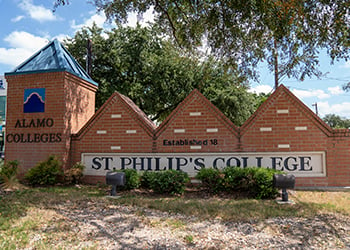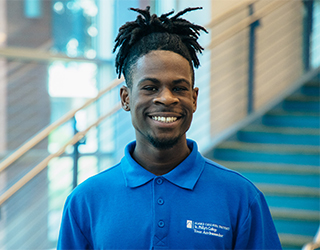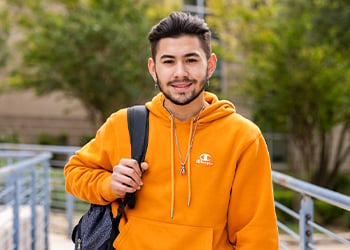SPC's sixth Piper Professor is Gregory Charles Hudspeth, Ph.D.
May 1, 2019
THE MINNIE STEVENS PIPER FOUNDATION HAS SELECTED ST. PHILIP’S COLLEGE ASSOCIATE PROFESSOR GREGORY CHARLES HUDSPETH, PH.D., AS A PIPER PROFESSOR AWARD RECIPIENT FOR 2019
Teaching for 41 years, Hudspeth has taught 22,000-plus students at St. Philip’s College that has been rightfully described by local civic leaders as a pillar of education in the nation’s seventh largest city

SAN ANTONIO (May 1, 2019)---The Minnie Stevens Piper Foundation announced today the selection of St. Philip’s College associate professor Gregory Charles Hudspeth, Ph.D., as a 2019 Piper Professor award recipient.
Begun in 1958 with eight awards, the roster of Piper Professors annually includes up to 10 outstanding professors from the state’s two- and four-year colleges and universities, public and private. The foundation possessed overwhelming and award-worthy evidence that Hudspeth-the-nominee was particularly effective in the classroom and in personal contact with students. Hudspeth earned his master’s degree in political science from St. Mary's University, and his doctorate degree in leadership studies from Our Lady of the Lake University, but he also took summer classes from influential teachers at St. Philip’s College as an undergraduate student. The fact that he demonstrated an unusual dedication to both the profession of teaching and the purposes of the institution where he teaches helped Hudspeth earn a Piper Professor award for students at one of the original homes of the 61-year-old Piper Professor recipient experience.
Prized by students, alumni and employers who seek teachers of the highest academic rank in a college for a particular branch of learning, a professor is a scholar with a doctorate degree. A Piper Professor is a professor noted for exceptional teaching. St. Philip’s College students and alumni have learned under the following six Piper Professors since the program started in 1958 to recognize educators for exceptional achievement in the teaching profession: Roger W. Lee, chairman, division of natural sciences (1958), Clarence W. Norris, professor of sociology (1970), Dolores C. Villarreal, associate professor/chair of medical clerical programs (1979), Hazelyn Lewis, faculty senate president and associate professor of English (1989), Elizabeth (Dollie) Hudspeth, associate professor of English (2003), and Gregory Charles Hudspeth, associate professor of Political Science (2019). One-third of the college’s first six Piper Professors are now from the same family and one-half of the college’s Piper Professor cohort is female.
Piper Professor Gregory Charles Hudspeth is a senior St. Philip's College social and behavioral sciences faculty member in a department that annually builds the knowledge of 3,500 social sciences students. As an associate professor of government and 2011-2012 faculty senate president at the college, Hudspeth was recognized off-campus as a Silver Life Membership civil rights award recipient by the leaders of the now 101-year-old San Antonio branch of the NAACP in 2011. His father Charles A. Hudspeth, Jr. (1918–1999) was the second-longest serving president of that branch (1986-1996). As a member of the association’s host city team, Gregory Hudspeth was active in the success of the association’s 109th Annual Convention held for the first time in San Antonio during the summer of 2018. This was after moderating a teachable moment---the November 2017 San Antonio stop of the NAACP Listening Tour of public meetings, in his capacity as chair of the San Antonio branch of the NAACP's Fair Housing Committee. Hudspeth became the association branch leader in 2018, and his experiences have informed more than 22,000 students physically in his campus classroom and virtually through his online classes. While the higher education industry leader's 2019 award is formally announced today---he took time to speak to his journey in an edited conversation, recalling his St. Philip's College experiences, including teaching social and behavioral sciences courses for alumni of the 121-year-old college from 1977-2019. The award-winning St. Philip’s College professor attends his final graduation ceremony as an active faculty member---and his first as a Piper Professor---later this month.
Q: What has 2019 represented to you?
A: This has been an unbelievable year for me. I was selected to lead the San Antonio Branch of the NAACP and to get this [Piper Professor Award] at the same time is just unbelievable. We’re pretty excited about it. I had a meeting last week with the [San Antonio Police Department] police chief, and on May 6, I have a meeting with the city manager, and later the city district attorney---all NAACP related. My dad had tremendous influence on me. I’m the middle of three. My dad is Charles and I have his middle name. When I was growing up in San Antonio, my father and I were active with NAACP and we established strong relationships with [activist-statesmen] Claude Black and G. J. Sutton. Black would come to our house for every Christmas dinner. I was a deacon at his church. My father was chair of the trustee board at Mt. Zion First Baptist Church and now I am.
Q: Can you speak to the award-winning scope of your impact on student success at the college? This scope also includes 10 seasons of Internet teaching, roughly 25 percent of your student-teacher relationship at the college, correct?
A: Over the 41 years we are looking at slightly over 22,000 students having been taught by me. I am doing Internet classes, I did five this semester and I started doing Internet classes in 2008. That was the year I returned to the classroom from administrative service. I've been doing this [Internet teaching] for 11 years. My tenure status achieved many years ago was another catalyst to working and advancing my teaching even more. Tenured professors don’t go dormant. We work hard, and primarily we love what we are doing. We love moving the needle for students, especially through the Internet. Old professors like me don’t mind getting into the new technology. I love the technology, while understanding both the strengths and the weaknesses of Internet teaching on a high level. The positive thing about my teaching higher education online is my current online students are able to do their work virtually 24 hours a day, not restricted to classroom time. However, my Internet students do not experience the [real-time] face-to-face exchanging of information with their peers that my classroom students experience.
Q: The Piper team asked you to personally provide career highlights. You did that. But time moves on and you have more to share post-Piper, correct?
A: My dad was the president of the NAACP San Antonio branch in the 1980s and this is the first time there has been a father-and-son president of the NAACP branch. My wife and I have Pipers, a first at St. Philip's College. My wife is an NAACP officer as well. Earl and [former SPC associate professor] Hazelyn Lewis were at Trinity and got Pipers. For years when we dined together, I was the only non-Piper in that group. Many times I was an administrator and ineligible for nomination for the award, as this is truly a teaching award and this is an exciting time.
Q: You’ve served 30 percent of the college’s 121-year service life. How did you become involved with the St. Philip’s College experience?
A: I’m from San Antonio and the East side, and I took swimming at St. Philip’s College as a kid. Later I was teaching at public schools and at John Jay High School. I was going to go to law school. Once I got here, I was so satisfied, I took law school off of my agenda. There are several people who taught here and went to law school at the same time. There was a long list and I chose not to do that at the end of the day. Instead, I’ve served under all of the college’s presidents with the exception of Ms. [Artemisia] Bowden and I’ve never tried to count them. I came in as [SPC’s second Piper Professor] Clarence Norris was teaching in my department. I started with [SPC dean, the equivalent of president] John Murphy. When I graduated from graduate schools in San Antonio, St. Philip's College and San Antonio College were the only two community colleges in San Antonio. I had friends, [SPC faculty members] James New and Johnnetta Slaughter and [dean of students emeritus and University of Pennsylvania alumnus] Bill Hudgins. When I was working on my masters, [SPC faculty member] Marion Sterling was a classmate at St. Mary’s University and teaching at St. Philip’s College.
When I was an undergraduate student at Huston-Tillotson College in Austin, I would come home [to San Antonio] to take courses at St. Philip’s College during the summer months. St. Philip’s College professors taught me college-level math, trigonometry, algebra, American history and Texas government during the summers. Huston-Tillotson was good for me. It challenged me in a way that benefitted me over the years. Plus it being an HBCU gave me a sense of identity and what I needed to know to be successful. You are only successful if you are able to bring others up with you.
Q: Another family commonality is you and Dollie are both retiring within six months of each other. In January you were present for the board’s acknowledgement of her retirement after 41 years of service to students that included about 15 years with the Piper Professor status earned at St. Philip’s College in 2003. She actually served many St. Philip’s College students to perfection for years with her Piper, and you were one of her Alamo Colleges District colleagues during that time as well.
A: There are 10 Piper recipients statewide each year, after looking at each college and university. If you look at the recipients, they are individuals who have taught with track records of student service for many, many years. I know the work of both Hazelyn Lewis and Dollie. They were both Piper Professors with longevity and a great deal of student involvement over a period of years. And they had an impact on the community.
St. Philip’s College is basically a major hub of the East Side. It is and has been the higher education institution of the East Side. We have expanded our horizon beyond [to worldwide operations] because of innovative allied health and applied science and technology programs. But when we looked at students coming out of high school and not able to get away [from San Antonio to attend college], St. Philip’s College was an obvious choice. Two of my Huston-Tillotson roommates were transfer alumni of St. Philip’s College. What we typically do in our lives is to identify others with goals similar to ours. Dollie and I have been married 49 years this year, and part of that is we had similar goals. When we studied together in college, a date might be a night at a library. You have people with similar goals who are likely to associate with each other. We did our bachelors and masters degrees together and we did our Ph.D.s together in different disciplines at the same time. That is a relationship of being married to someone with the same sorts of academic ambitions and goals.
Q: The recent award is for excellence in teaching. Can you speak to that, please?
A: Teaching is always the thing they will look for when selecting a Piper Professor Award recipient. I taught and worked with students even as an administrator---particularly first-time-in-college students---in my 41 years of being here. Teaching can never be about your own accolades. It has to be students first. As a society, we get caught up sometimes with “what's in it for me?” But the question is, how do we move the needle for our students? From time to time I will encounter former students who will talk about their experiences. That comes from having talked to over 22,000 students. [Former SPC president] Patty Candia was one of my students. [Current SPC Dean for Academic Success, Arts and Sciences] George Johnson was one of my students. The principal of Sam Houston High School was one of those St. Philip’s College students of mine who have been fairly successful in what they have done. One of our first-time-in-college homeless students is now an attorney in San Antonio. I taught graduate classes in public policy at Our Lady of the Lake University and had several offers to teach at UTSA but could never work that into my schedule. At the end of the day, you have helped someone make the world a better place. I was able to articulate that I cared about bringing the institution forward, through teaching our students. It was about moving the students and the institution forward, through teaching.
Q: In 2011 you said “Making it a better world for others is a part of my family’s legacy. The NAACP has been an organization of people who have looked for a level playing field for all people. Not all people have been treated equally, and they attempt to give everyone an equal opportunity. St. Philip’s College has been a great place. What that means is we have attempted to be all-inclusive in college instructional activity and community involvement, especially for the residents of the East Side of San Antonio.” With that in mind, can you please describe the final semester experience leading up to a St. Philip’s College graduation ceremony with a record number of students receiving degrees and certificates.
A: This is a wonderful way for me to go out after having served for all of these years. I set my retirement for the end of May, but my official retirement will be the end of June. As I depart, it's always good to go out on top. Not that there’s a requirement you leave. You are going out on your terms.
Teaching for 41 years, Hudspeth has taught 22,000-plus students at St. Philip’s College that has been rightfully described by local civic leaders as a pillar of education in the nation’s seventh largest city. Hudspeth can be reached at (210) 486-2480, ghudspethsr@alamo.edu. (Courtesy image)




